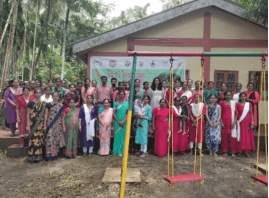The message of protecting and educating the girl child took centre stage at an awareness programme organised under the national Beti Bachao, Beti Padhao campaign at Rest Camp, Mayabunder. The event, conducted by the District Administration in association with the ICDS Project Rangat, featured a range of activities aimed at highlighting gender equality and encouraging community participation in supporting the empowerment of girls.
The day-long programme was hosted at the Anganwadi Centre and drew participation from local officials, ICDS functionaries, and members of the community. The Deputy Commissioner of North and Middle Andaman attended alongside residents, reflecting how the initiative is designed to be both a government effort and a community-driven movement.
Among the highlights of the programme was a skit performed by Anganwadi workers. The play captivated the audience with its portrayal of the social challenges faced by girls and carried a strong message about the importance of education and protection. Through performance, the workers communicated the reality of gender discrimination and the need for collective responsibility in ensuring opportunities for girls. Such cultural interventions are often used in awareness drives because of their ability to engage audiences emotionally while driving home policy messages.
To complement the cultural activities, a plantation drive was also organised during the programme. The Deputy Commissioner, joined by other dignitaries, planted saplings as a symbolic gesture of commitment towards nurturing a healthier and more secure future for girls. The act reinforced the message that empowering the girl child is an investment in future generations, much like planting trees for long-term sustainability.
The Anganwadi Centre’s Children Park was also redeveloped to create age-appropriate play zones, offering a healthier environment for mothers and children to spend time together. Such initiatives are designed to enhance the physical and social development of children while creating safe community spaces for families. The emphasis on child-friendly infrastructure reflects the holistic approach of Beti Bachao, Beti Padhao, which not only advocates for girls’ education but also promotes environments where children can thrive.
A signature campaign formed another important component of the programme. Attendees were invited to pledge their support to the Beti Bachao, Beti Padhao cause by signing their names, thereby making a public commitment to gender equality. The campaign drew participation from men, women, and youth, underlining how empowering girls is not a responsibility of one section of society but a collective undertaking that requires support from all.
The programme also included a food mela that displayed nutritious food items essential for maternal and child health. Beyond being an engaging activity for the community, the mela served as a practical educational tool. Mothers and expectant parents were provided with information on dietary practices that support the growth and development of children. By tying nutrition awareness to the theme of girl child empowerment, the programme connected health with broader issues of equality and development.
The Deputy Commissioner praised the efforts of Anganwadi workers for their role in bringing about change at the grassroots level. Their presence in villages and regular interaction with families gives them a unique position to spread awareness and encourage behavioural shifts. In campaigns like Beti Bachao, Beti Padhao, this local connection ensures that the message does not remain abstract but becomes embedded in everyday conversations and practices.
The Mayabunder awareness drive reflected how national programmes can be adapted to local contexts, using skits, plantation, nutrition fairs, and community pledges to engage people directly. By involving different generations and both men and women, the event created an inclusive platform to reinforce the importance of protecting and educating girls. For the islands, where community bonds remain strong, such initiatives play a vital role in shaping social attitudes and ensuring that the message of equality resonates widely.





